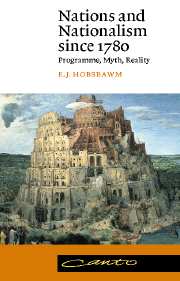Introduction
Published online by Cambridge University Press: 05 July 2012
Summary
Suppose that one day, after a nuclear war, an intergalactic historian lands on a now dead planet in order to enquire into the cause of the remote little catastrophe which the sensors of his galaxy have recorded. He or she - I refrain from speculating on the problem of extraterrestrial physiological reproduction - consults the terrestrial libraries and archives which have been preserved, because the technology of mature nuclear weaponry has been designed to destroy people rather than property. Our observer, after some study, will conclude that the last two centuries of the human history of planet Earth are incomprehensible without some understanding of the term 'nation' and the vocabulary derived from it. This term appears to express something important in human affairs. But what exactly? Here lies the mystery. He will have read Walter Bagehot, who presented the history of the nineteenth century as that of 'nation-building', but who also observed, with his usual common sense: 'We know what it is when you do not ask us, but we cannot very quickly explain or define it.' This may be true for Bagehot and for us, but not for extragalactic historians who have not the human experience which appears to make the idea of the 'nation' so convincing.
- Type
- Chapter
- Information
- Nations and Nationalism since 1780Programme, Myth, Reality, pp. 1 - 13Publisher: Cambridge University PressPrint publication year: 1992
- 5
- Cited by

